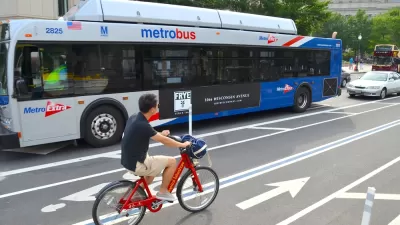As remote work and changed commuting patterns endure, transit agencies are shifting their focus to serve a wider variety of riders.

Transit agencies like Bay Area Rapid Transit (BART) in the San Francisco Bay Area are reworking their schedules to provide more frequent service on nights and weekends, and running shorter trains to improve safety by having more people in each car as ridership remains relatively low, writes Jared Brey in Governing. “As part of the change, the agency is also reducing service on weekdays on several lines,” Brey adds.
On the other side of the country, “the Massachusetts Bay Transportation Authority in Boston launched new night and weekend service on its commuter rail lines,” and “The Metropolitan Transit Authority in New York has been incrementally increasing midday, night and weekend service over the last year, in keeping with new investments included as part of the budget deal that helped the agency resolve its fiscal cliff.”
Washington, D.C. and Philadelphia are also increasing service on off-peak hours in a bid to, in the words of Philadelphia’s Southeastern Pennsylvania Transportation Authority, create a network that can be “easily and reliably used for any sort of trip — whether that be commuting, everyday errands or leisure activities.”
FULL STORY: Transit Agencies Rethink Schedules for Fewer Commuters

Maui's Vacation Rental Debate Turns Ugly
Verbal attacks, misinformation campaigns and fistfights plague a high-stakes debate to convert thousands of vacation rentals into long-term housing.

Planetizen Federal Action Tracker
A weekly monitor of how Trump’s orders and actions are impacting planners and planning in America.

Chicago’s Ghost Rails
Just beneath the surface of the modern city lie the remnants of its expansive early 20th-century streetcar system.

Bend, Oregon Zoning Reforms Prioritize Small-Scale Housing
The city altered its zoning code to allow multi-family housing and eliminated parking mandates citywide.

Amtrak Cutting Jobs, Funding to High-Speed Rail
The agency plans to cut 10 percent of its workforce and has confirmed it will not fund new high-speed rail projects.

LA Denies Basic Services to Unhoused Residents
The city has repeatedly failed to respond to requests for trash pickup at encampment sites, and eliminated a program that provided mobile showers and toilets.
Urban Design for Planners 1: Software Tools
This six-course series explores essential urban design concepts using open source software and equips planners with the tools they need to participate fully in the urban design process.
Planning for Universal Design
Learn the tools for implementing Universal Design in planning regulations.
planning NEXT
Appalachian Highlands Housing Partners
Mpact (founded as Rail~Volution)
City of Camden Redevelopment Agency
City of Astoria
City of Portland
City of Laramie





























